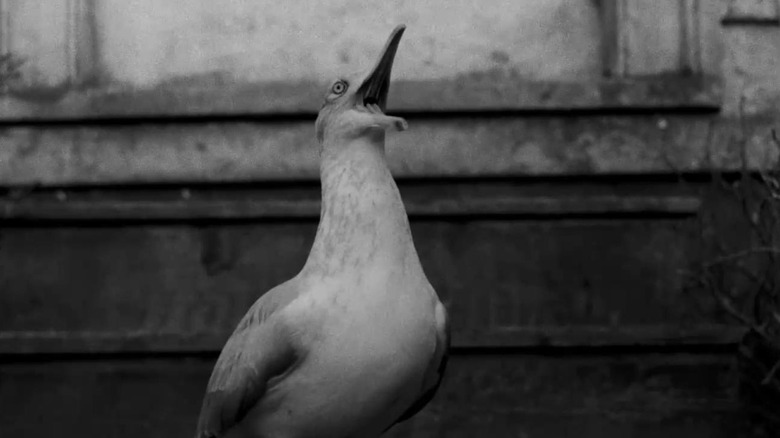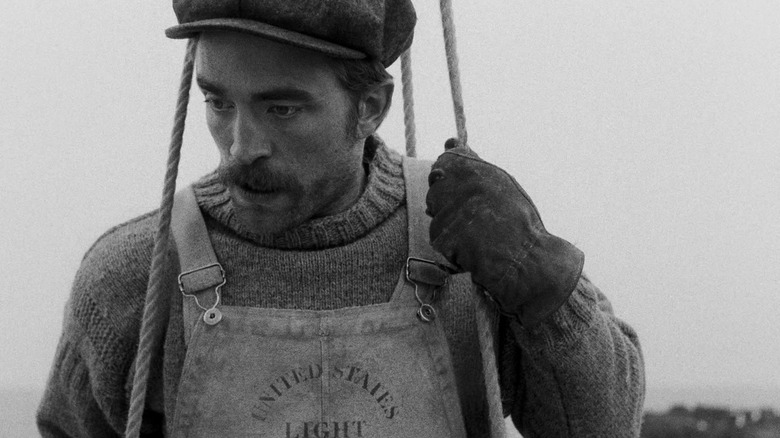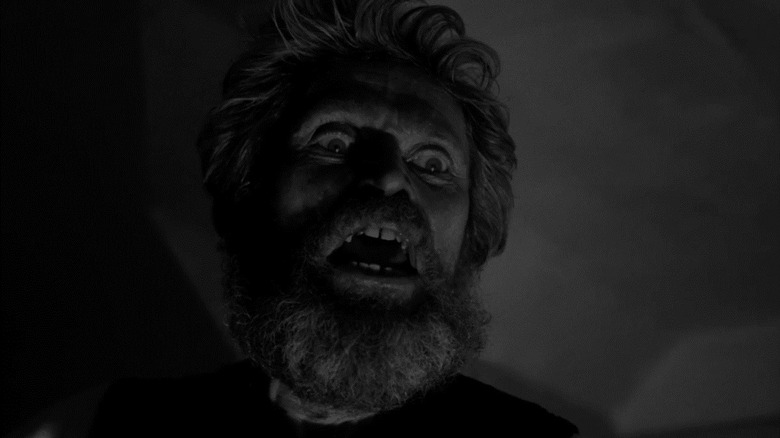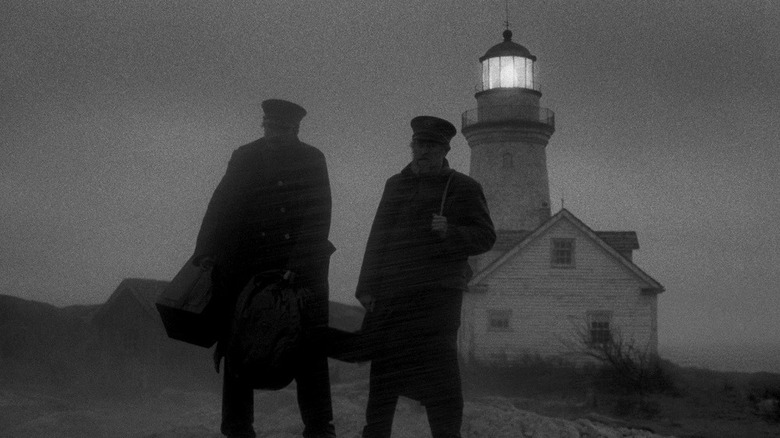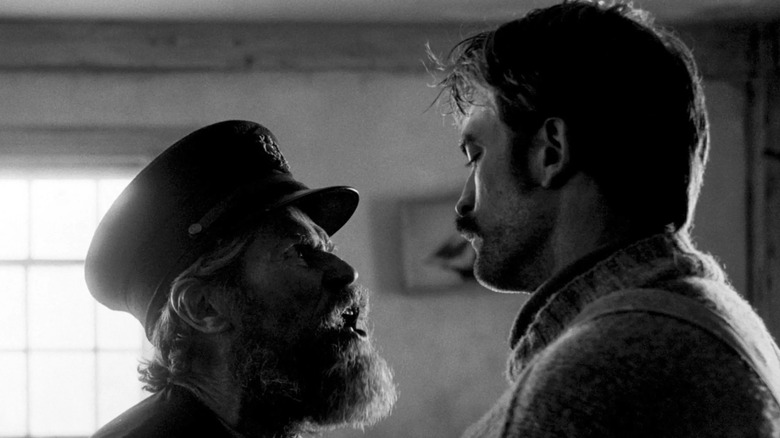Exploring The Many Metaphors And Symbolism Of The Lighthouse
Robert Eggers' "The Lighthouse" and Céline Sciamma's "Portrait of a Lady on Fire" were both released in the United States in 2019, providing audiences with two of the best films of the year. The two films might serve as two sides of the same coin, and would make an excellent double feature. They both have a similar setup, each with two individuals, sealed off from out outside world, lost on a remote island with only one another's company to keep them sane.
"The Lighthouse" sees its isolated world as infected with brutish masculine pride, leavened only by violent outbursts of idiocy. In "Portrait," two women stare at each other, make art, and fall madly in love, finding beauty, affection, and an exhilarating, potentially new world where their love with prevail over patriarchal norms. Women create, we see. Men destroy.
Women fall in love in their dreams, singing with their fellow women around a campfire. Men pee into the dirt in their nightmares, and drink isopropyl alcohol to avoid feeling anything. They then stuff each other's mouths with dirt. Women walk along the seaside. Men are attacked by one-eyed seagulls. They are both brilliant works, Eggers' and Sciamma's films, and compliment each other warmly.
"The Lighthouse" takes place in, as the Bard might say, time is out of joint. The cold, wet, muddy island where the action takes place is so unbearably miserably, smelly, and isolated, time loses all meaning. The two men on the island are unable to tell if they had been there days, weeks, or even years.
The symbolism in "The Lighthouse" is fraught and rich, with some of it being wholly obvious; the lighthouse itself is quite clearly a massive phallus. And there are so many more Jungian undercurrents to explore. Let us delve.
Wickie Pedia
In plain terms, "The Lighthouse" is about two men, an old lighthouse keeper named Thomas Wake (Willem Dafoe) and his new assistant "wickie," a hollow-eyed young man played by Robert Pattinson. It is the 1890s, and they have been tasked with keeping a lighthouse alive, just the two of them, for the entire season. The Pattinson character may be named Ephraim Winslow, but that will eventually be questioned. Ephraim and Wake do not get along. Wake farts a lot and tasks Ephraim with emptying chamber pots and hauling gigantic canisters of kerosene. At night, they both drink and masturbate to fantasies of mermaids. It won't be long before Ephraim is going mad and hallucinating monsters.
There is a turning point in "The Lighthouse" about halfway through when a storm hits, and Ephraim realizes that the ship that was to pick him up and end his horrid stint as a lighthouse keepers' assistant is not coming. After that, his dark fantasies increase, his madness takes hold. If we're to accept that "The Lighthouse" is a tale of a man being psychologically ripped apart by the world's worst job, then it's a rather straightforward drama.
But what are we to make of Wake's refusal to let Ephraim into the upper room of the lighthouse?
Wake undergoes his own strange, almost drug-like ritual wherein he basks in the light of the lighthouse lantern. It could easily be argued that Wake has access to something sacred, something holy — perhaps even God — and that he is gatekeeping. Ephraim wants access to the divine light, but is constantly denied. Is Wake a corrupt Catholic priest, keeping one of his flock from the light of God out of spite?
Guilt and divine forgiveness in The Lighthouse
Or, if we're to continue the Christian metaphor, is Ephraim merely facing a personal obstruction to God's divine light? It's possible that Wake is not merely a bad boss and a torturer, but metaphorical obstruction in Ephraim's head. There is something that is torturing Ephraim, something from his past, and it's brought him into the proximity of Heaven's light, but unable to access it. Wake can access the light, and Ephraim is jealous. He will kill to gain access again.
Recall that in Dante's "Divine Comedy," Purgatory is represented as a massive tower. The souls of humans, as they climb the tower of Purgatory, slowly purify themselves. The higher they climb, the closer to Heaven's light they reach. And what is a lighthouse if not a purgatorial waiting chamber with Heaven's protective light at the top?
Whether or not Eggers was leaning in the direction of Christian parable can be debated (and the film certainly possesses none of the bland, stultifyingly beatific attitudes of a typical Christian work), but he is very clearly telling a tale of guilt, and how guilt leads to madness and paranoia. Also how redemption isn't part of the universe. Early in the film, it's explained that Ephraim used to work at a lumberyard, and that his former foreman was killed underneath tumbling logs.
Ephraim has been scarred by his foreman's death. He either witnessed his boss betting killed ... or he deliberately murdered him (as Wake implies). Either way, Ephraim has visions of drowning under logs, a clear sign of his guilt and powerlessness (also, more phallic symbols!). Ephraim is working at a lighthouse as an escape, either from trauma or from the law. The guilt and horror of his previous job, however, is inescapable.
Is Ephraim a murderer? Is Wake?
So, Ephraim may be a murderer trying to escape a crime. It's implied as well, however, that Wake might also be a murderer. Ephraim never gets the full story of what happened to the previous wicki on the island, and eventually, Ephraim finds the old wicki's severed head in a fishing net. Is this a symbol of what he may be facing on the island — his eventual "death" at the hands of guilt-induced madness — or is it more literal than that? Did Wake murder his old wicki, and now has to do the same to his successor?
Indeed, after Ephraim finds the head, his madness increases ... or Wake's manipulation of him does. Wake aggressively gaslights Ephraim, telling him that he might have been at the lighthouse for weeks, but also that it might have been there for years. Also, Wake is the one who insists they get drunk by drinking gulps of kerosene, implying that they're both slowly being poisoned. The story of "The Lighthouse" could very well be the tale of Ephraim coming to work for a murderer, and the murderer going about his bleak business when Ephraim finds evidence of his crime.
But "The Lighthouse" is also much more than a bleak crime thriller. More than anything, as stated above, it's a film about the horrors of masculinity, of maleness, and how male pride/ignorance/violence can break down the human mind.
Looking over pirates and naval men of pop culture, one can glean that living by the sea as a grizzled sailor is a broad archetype of masculine virility. Men, when forced to live with the odors and boners of other men, are driven mad by the filth.
Toxic masculinity in The Lighthouse
Some have said that "The Lighthouse" is a homoerotic film, but that doesn't quite describe what's going on. Wake and Ephraim are not in love, nor are they repressing their sexual attraction toward one another. At the very least, they are feeding off of one another's sexual frustrations, becoming increasingly open with their sexual fantasies and their masturbation habits. This doesn't so much depict a slowly growing sexual regard, however, as it is a vital breakdown of personal space. The increased sexual energy between the men doesn't denote an uptick in intimacy, but a downtick.
In an article in Mashable, Willem Dafoe hit the nail on the head, when he said the film was about "Toxic masculinity! [The characters are] pushing each other's buttons out of fear and out of threat of who they are. And they're both guilty. They have a sense of guilt, of wrong." He also pointed out that the story was also a battle of wills. About two men trying to assert their own meager control over one another.
To go back to the comparison to "Portrait of a Lady on Fire," one can see the juxtaposition between toxic masculinity and supportive femininity. Two men, when locked into a room together, become obsessed with their own guilt and compensate by playing an emotional game of dominance and one-upmanship. Women, when thrust into each other's company, spend their time looking at each other and appreciating the love and beauty they possess.
At the end of the day, "The Lighthouse" is about aggressive, masculine control, used to cover up the emotional madness within.
It's a great film.
